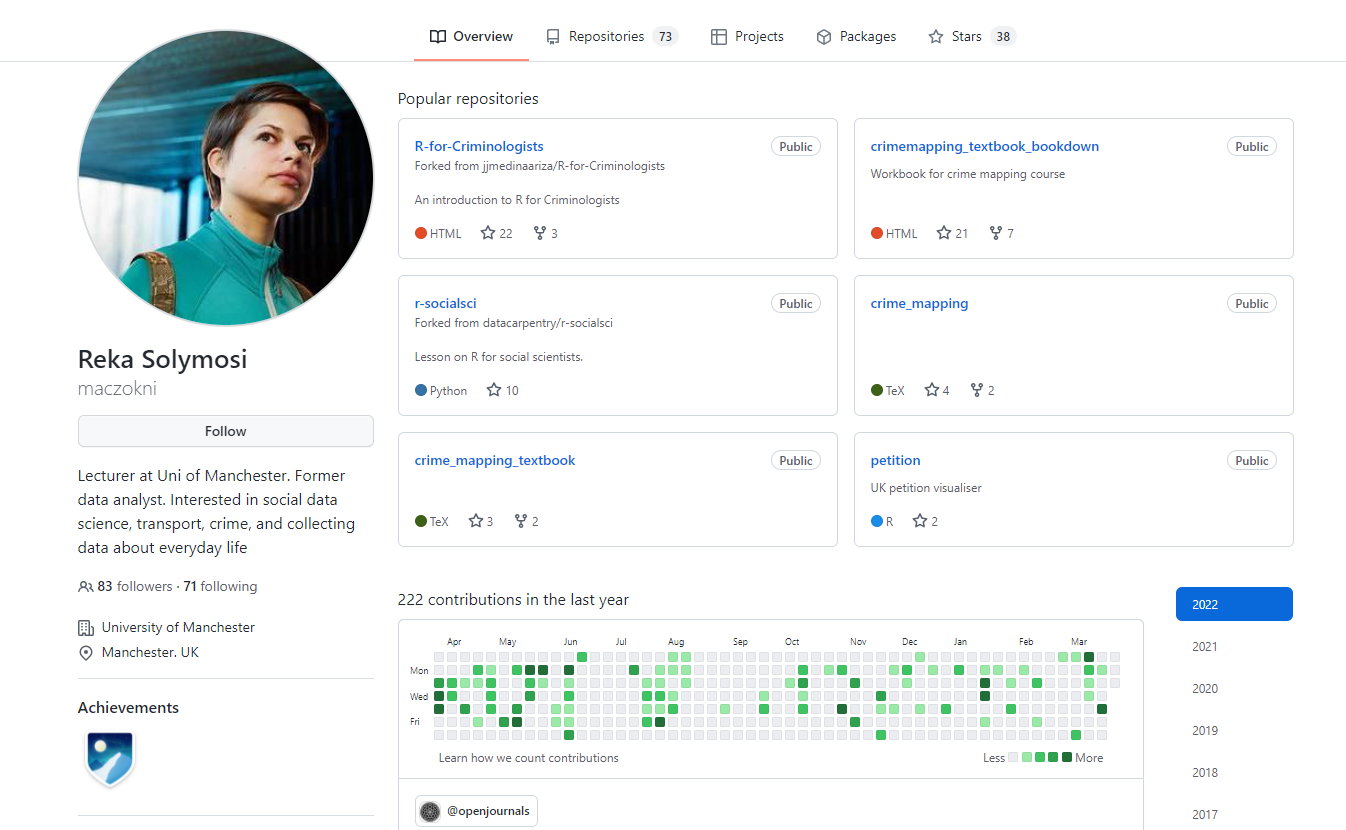Teacher of the Year 2021 (Humanities) Part 2: open source communities
 Dr Réka Solymosi is a Senior Lecturer in Quantitative Methods within the School of Social Sciences, an Honorary Lecturer at University College London, and a member of the Software Sustainability Institute. She joined the University in 2016 after a period working as a data analyst with Transport for London. Her research focuses on making use of new forms of data to gain insight into people’s behaviour and subjective experiences, particularly focusing on crime, victimisation, transport, and spatial research. Réka was awarded Teacher of the Year 2021 for the Faculty of Humanities (one of the university’s annual Distinguished Achievement Awards).
Dr Réka Solymosi is a Senior Lecturer in Quantitative Methods within the School of Social Sciences, an Honorary Lecturer at University College London, and a member of the Software Sustainability Institute. She joined the University in 2016 after a period working as a data analyst with Transport for London. Her research focuses on making use of new forms of data to gain insight into people’s behaviour and subjective experiences, particularly focusing on crime, victimisation, transport, and spatial research. Réka was awarded Teacher of the Year 2021 for the Faculty of Humanities (one of the university’s annual Distinguished Achievement Awards).
In the second of this two-part feature on Réka’s practice, she shares how she develops her pedagogic approach to data literacy in the social sciences.
Pedagogic communities
In my previous post I shared some practical tips that I’ve found useful in my teaching, including a six-step approach that I use to maximise student engagement across a range of learning styles. I developed this approach as a result of combining what I’ve learned from colleagues and research that others have done, so I cannot stress enough how vital sharing best practice between academics is for this kind of topic. For example, the combination of a homework task with Blackboard quizzes I mentioned came from a colleague in Economics, where they deal with even larger student populations than those I experience in Statistics. They had been forced to innovate and to find a solution to the marking problem – which was applicable to my course too.
Similarly most lab-based courses are supported by a team of teaching assistants, who can sometimes be easier for students to engage with or relate to. Maintaining a constant dialogue with TAs makes it easier to keep abreast of how your students are doing. As a rule, checking in with other teaching staff is always going to be more helpful than relying purely on your own experiences and perspective. Engaging with forums of best practice, and the work of other academics throughout the sector, is extremely helpful in building your own approach to pedagogy. I feel confident that anyone can improve their teaching this way, and it is a relatively easy piece of advice to act on.
This can take as much time as you give it – a simple explanation or visualization can always be a little bit tighter or neater, or better informed by further research. Teaching is supposedly around 40% of my role but when I started building my courses on Modelling Criminological Data and Making Sense of Criminological Data, it felt more like 140% of my contracted hours. However, scheduling time to invest in students is really rewarding, and it is also an exercise in time management.
Open source communities
Given how much of my work is built upon the practice of my peers, it’s no surprise that I am an advocate of taking an ‘Open practitioner approach’ to teaching. In essence, this means sharing good practice to people across the sector who are engaged in any sort of similar teaching. Sharing things like course materials, helpful papers, and how to apply this knowledge in the lecture hall can positively impact higher education on a global scale- and encourage others to do the same. I’ve had colleagues from as far as New Zealand email me their thanks for the content I have made available, saying my work was vital in convening their programmes.
I think a lot of people imagine there’s a high bar for entry when it comes to open research. As academics and scientists it’s easy to think that anything we share must be in a publishable state, and therefore requires time we don’t have, but that is far from the truth. Posting your work in a raw state can benefit your teaching on a very practical level. When I post something to and someone levels criticism at my approach or workings, it is good to have that critique, because you want to be working from a correct premise. So I publish the material to students and on GitHub regularly and tend not to do any cleaning or refining of the content to get it ‘ready for publication’ at all, instead releasing the same content my students see when I teach them. When I refine something in response to feedback, that goes back into my teaching as well.

Fig 1: Réka has found keeping a GitHub Profile up to date extremely valuable and an easy way to get feedback on her work.
The open-source community is something that I rely on a lot, so in turn I want to contribute what I can. It really is hard to learn how not to feel like an imposter, but taking this approach is such a powerful tool for self-improvement. As well as giving something back to the community it lets you get feedback that further develops your ability as a lecturer and practitioner.
Further information
- Distinguished Achievement Awards 2021 – watch the online awards celebration for Teachers of the Year
- University Distinguished Achievement Awards – nomination process for Teacher of the Year







0 Comments